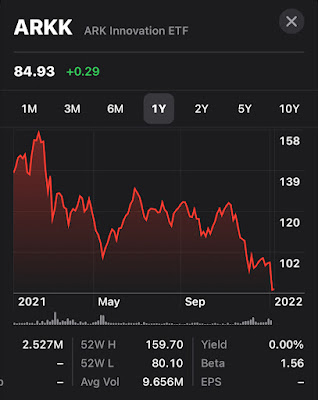ARKK Barometer
A disciple of Arthur Laffer, Wood started her investment firm with the underlying thesis of disruptive innovation underpinning her investment goals, namely that disruptive companies create new markets and value networks. These companies hope to displace established market leaders aka entrenched monopolies.
In essence Wood is betting on a future of new technology that would improve humanity with better efficiency, because as a rule monopolies become less efficient and innovative as they mature into complete control of a market.
So why has Cathie's fund be cut in half? Rather than a collapse in the underlying technology, I believe there has been a 180 degree change in investor sentiment that believes reward (or gain) will come from "established" (read monopolies) that have existing market share, customers, and the big "E" in the P/E ratio...EARNINGS.
Mathematically, investors are betting on "business as usual" rather than innovation. Why? Because they are receiving signals that entrenchment wields the power and will be rewarded. Why? Because those are the signals being sent by Washington. How? Increased taxation. Increased regulation. Increased inflation. Increased enforcement. Decreased autonomy. Decreased workforce flexibility. Decreased worker qualifications. Those are a handful of the signals flashing. Investors have taken note.
Contrary to popular belief, Wall Street isn't dumb. Money flows where it is welcome and makes a return. Typically it chases winners. Just take a look at net new flows of money. It almost always flows into funds that have most recently performed well. And flees poorly performing funds. It seeks to survive and grow by chasing returns. The most successful funds of 2021 were the tech monopolies and natural resource monopolies. Small innovation got utterly crushed.
My final thought on this subject is that immutable laws are hard to break. They can be avoided. They can be postponed. But ultimately there is a reckoning. Although policy and regimes may put their weight behind the status quo, ie monopolies, the proverbial sidewalk flower will grow in a concrete jungle.
